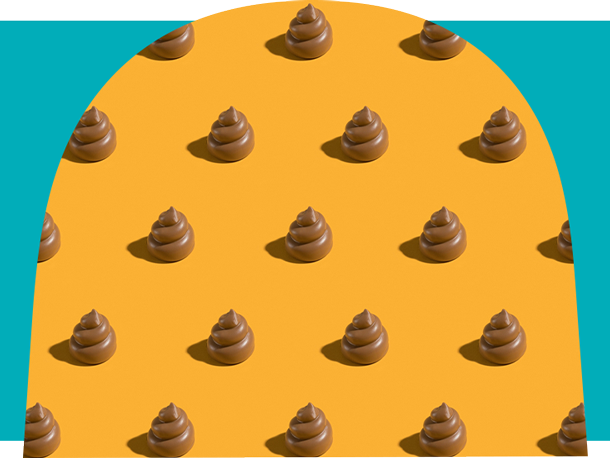💩
͏ ͏ ͏ ͏ ͏ ͏ ͏ ͏ ͏ ͏ ͏ ͏ ͏ ͏ ͏ ͏ ͏ ͏ ͏ ͏ ͏ ͏ ͏ ͏ ͏ ͏ ͏ ͏ ͏ ͏ ͏ ͏ ͏ ͏ ͏ ͏ ͏
| | | | | Going number two might not be the prettiest topic for a dinner party, but there's much to learn from this mundane yet mysterious process. Although the size, shape, and smell of everyone's poop is unique, there are a few signs that may indicate your stool is healthy (or not). Keep reading for more information. | | | | | | | Let's go,
Morgan Mandriota
Newsletter Editor, Healthline |  | | Written by Morgan Mandriota
October 3, 2025 • 3 min read | | | | | | | |
| |  | | | | What different types of stool might mean about your health | | 🌈 A brief guide to poop color: | - Brown: Varying shades of brown are considered normal and are no cause for concern.
- Black: Black stool may be due to consuming licorice, iron supplements, charcoal, or bismuth medications. It could also be a sign of bleeding in the upper gastrointestinal tract.
- Green: Hints of green may be normal. It could be caused by a viral or bacterial infection, or you might be eating more green foods (e.g., spinach, kale) lately, or perhaps your stools are passing through you quickly.
- Pale, white, clay: A chalky shade might mean you're lacking bile, which could signal a blocked bile duct. Pale poo could also be a side effect of certain drugs like anti-diarrhea medication.
- Red: Red stool could be from hemorrhoids or indicate bleeding in your lower intestinal tract. Bloody stool can also be a sign of serious medical conditions, including cancer. Eating beets, berries, red gelatin, or tomato juice can also cause redness.
- Yellow: Your stool might contain fat that has not been absorbed, especially if it's greasy, extra smelly, or floats. Culprits include celiac disease and giardiasis, a condition caused by an internal parasite.
| | 💩 A breakdown of poop shape: | - Type 1: "Marbles" or little pellets typically mean that you're constipated. It shouldn't happen frequently.
- Type 2: "Caterpillar" log-shaped but lumpy stool is a sign of constipation that also shouldn't happen often.
- Type 3: "Hot dog" stool that's log-shaped with some cracks on the surface is the gold standard, especially if it's somewhat soft and easy to pass.
- Type 4: Doctors consider it normal to have smooth and "snake-like" poop that happens every 1 to 3 days.
- Type 5: Having "amoebas" (small poop with clear-cut edges that's soft and easy to pass) might mean you're lacking fiber and should find ways to add some to your diet.
- Type 6: "Soft serve" (too-soft) consistency could be a sign of mild diarrhea.
- Type 7: Having completely watery stool, also referred to as "Jackson Pollock," means you've got the runs or diarrhea.
| | As quick as we are to write it off, your poop can provide a wealth of knowledge about your health. So, next time you go to the bathroom, take note of what's going on. If you notice any sudden and sustained changes, consider talking about it with your doctor. | | What else should you know about your poop as it relates to your well-being? Check out our new TikTok video below! | | | | | | | | |  | | | Fibermaxxing: The Gut Health Trend You're Doing All Wrong | | Join Dr. Sethi, a gastroenterologist, as he dives into the benefits and risks of increasing your fiber intake, how it affects your gut health, and practical tips on how to incorporate more fiber into your diet without experiencing gas, bloating, or other digestive issues. | | | | | | | | |   | | | | | | | | Until next time, |  | Take care of yourself, and we'll see
you again soon! | | |  | | |  | | This edition was powered by | | soft toilet paper. | | | | | | | | View in browser
Did a friend send you this email? Subscribe here.
To see all newsletters, click here.
Privacy | Unsubscribe
We may feature your messages to our inbox within our content. Please do not provide any personal identifiable information. Replies may be edited for length and clarity. For more, see our Privacy Policy.
Our website services, content, and products are for informational purposes only. Healthline does not provide medical advice, diagnosis, or treatment and should not be used as a substitute for medical advice from a healthcare professional. Healthline encourages you to make any treatment decisions with your healthcare professional.
Every product we recommend has gone through either Healthline's or Optum Now's vetting processes. If you buy through links on this page, we may receive a small commission or other tangible benefit. Healthline has sole editorial control over this newsletter. Potential uses for the products listed here are not health claims made by the manufacturers. Healthline and Optum Now are owned by RVO Health.
© 2025 RVO Health
1101 Red Ventures Drive
Fort Mill, SC 29707 | | | | |   | | |
| |